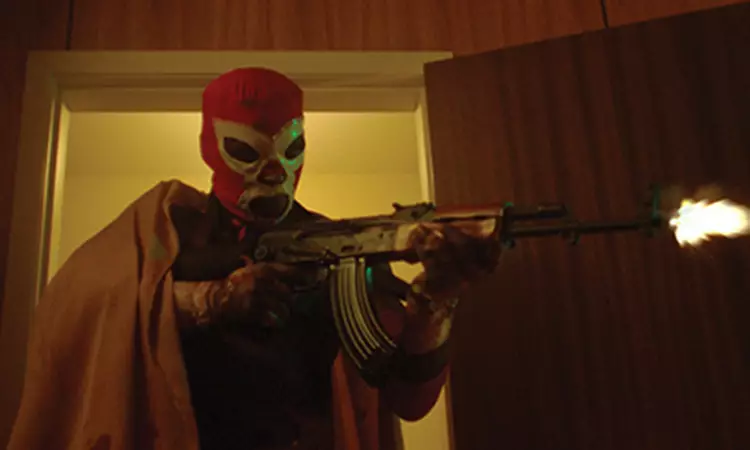Dark Match, directed by the talented Lowell Dean, made a striking entrance into the film landscape at Fantasia 2024, providing audiences with a unique blend of professional wrestling, horror, and the intricacies of personal struggle. At its core, the film embodies a captivating tension between the theatrical qualities inherent in pro wrestling and the raw physicality that wrestlers possess. This duality is more than a narrative mechanic; it reflects a deeper commentary on societal expectations surrounding gender, race, and the nature of ambition. As the story unfolds, we see the protagonist, Nic, also known as ‘Miss Behave’ (portrayed compellingly by Ayisha Issa), navigate her aspirations against a backdrop steeped in both occult dread and personal adversity.
At the heart of Dark Match lies the wrestling ring, a space that visually and metaphorically represents conflict. The opening moments of the film set the tone with an evocative montage filled with Satanic imagery accompanied by the tuneful yet defiant strains of Trooper’s “Raise a Little Hell.” This mixture serves as both an homage to the 1980s aesthetic while simultaneously invoking the occult themes that pervade the film’s narrative. The incorporation of retro elements, particularly the vintage VHS quality of the visual presentation, creates a sense of nostalgia that appeals to a wide audience while anchoring it firmly in its cultural context.
Miss Behave stands out as a tenacious female figure within a sport predominantly ruled by men. Her character embodies the struggle for recognition and validation in an environment rife with racial and gender biases. Through her quest for the prestigious trophy belt, we are invited to explore the larger societal questions around representation and the barriers that women, especially women of color, continue to face in competitive spaces. Her journey is not just about winning; it is about redefining her identity against the limitations imposed by those around her.
As the plot thickens, Miss Behave faces a lurking danger that transforms professional wrestling into a deadly game. The crew of SAW Wrestling, introduced with an array of caricatured personalities, find themselves in a horrifying predicament when they become entangled with a cult led by a character portrayed by Chris Jericho. This unexpected twist adds layers of complexity to the narrative, blurring the lines between reality and the fictionalized violence of the wrestling world. The “matches” they engage in are no longer mere performances; they are life-and-death confrontations designed to feed a sinister ritual.
The cult’s leader manipulates his followers, much like wrestling promoters manipulate narratives within the ring. Here, Dean reveals a profound commentary on belief and manipulation, encapsulating how narratives—whether in the realm of wrestling or life—can evoke powerful responses from audiences and participants alike. The cult members’ readiness to embody their roles in this deadly theater underscores the film’s overarching theme: the dangers of absolute belief in illusions, whether they come from scripted storylines or cultish dogma.
As the film progresses, Miss Behave emerges as a complex heroine, confronting not just physical foes but also institutionalized prejudices. The cinematographic choice of green lighting throughout the film signifies jealousy and envy, emotions that resonate strongly with the competitive nature of wrestling. Others, like her male peers, become embodiments of obstruction, perpetuating a system that favors particular narratives over others. In this context, her struggles resonate with a contemporary audience that recognizes the cyclical nature of these challenges in modern society.
The climactic battles that Miss Behave faces serve as allegories for larger social battles being fought outside the confines of the ring. In confronting both the cult and her own role within this harsh environment, she symbolizes a push against the boundaries of sexism and racism—fighting for a narrative that empowers rather than confines. This representation is both refreshing and necessary, as it reflects the journey many individuals experience in reclaiming their identities against societal expectations.
In its blend of horror, action, and introspection, Dark Match stands as a testament to the enduring appeal of wrestling as a form of entertainment and social commentary. Emphasizing the operatic grandeur of pro wrestling alongside genuine threats that challenge its characters, the film manages to be humorous, thrilling, and frightening all at once. Through clever storytelling and sharp visuals, Dean crafts a narrative that both entertains and invites deep reflection on the human condition within the surreal realm of wrestling. Ultimately, Dark Match is more than a mere wrestling film; it is a critique, an exploration, and a celebration of the complexities of performance and identity, wrapped in a bloody yet engaging package.

